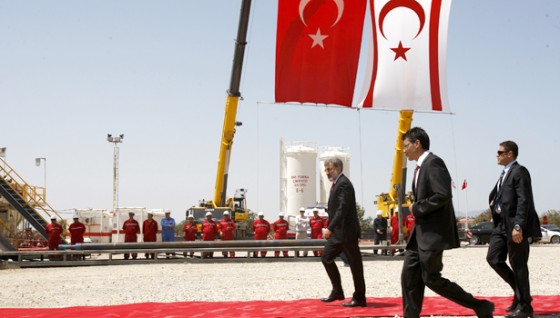 Turkish Energy Minister Taner Yildiz walks to the podium to speak during a ceremony marking the start of exploratory oil and gas drilling by Turkey in the breakaway Turkish Cypriot northern half of Cyprus, near Singrasi village, in April.
Turkish Energy Minister Taner Yildiz walks to the podium to speak during a ceremony marking the start of exploratory oil and gas drilling by Turkey in the breakaway Turkish Cypriot northern half of Cyprus, near Singrasi village, in April.
Turkey’s onshore wells near Singrasi came as hostilities ratcheted up between Turkey and the Cyprus Republic over ownership of the island’s oil and gas reserves. Now, local residents are concerned after black puddles appeared above ground around the wells, adding an environmental threat to the situation.
Villagers fear water contamination
The black puddles are primary collecting around the 3,000-meter-deep “Türkyurdu-1″ (“Turkish Homeland”) well near Singrasi Village, reports the Cyprus Mail.
An underground network of pipes lies around the area where Turkish state energy company TPAO was drilling, leading to villagers’ fears that chemicals from the drilling process or construction may have leached into their watersupply.
Two dignitaries from the Turkish Republic of Northern Cyprus (TRNC) visited the area several days ago and took water samples for testing at a laboratory in Turkey, leaving the villagers to wonder about the water’s safety in the meantime.
An energy race driven by fossil fuel addictions
Turkey began onshore drilling operations in the eastern Farmagusta province of TRNC just seven months ago, shortly after Cyprus started exploring the coastal natural gas reserves in its exclusive economic zone (EEZ).
When U.S. firm Noble Energy found vast gas resources in Cyprus’s offshore waters, it sparked a debate between Cyprus and Turkey over who should benefit from any oil or gas production on the island. Cyprus did not recognize Turkey’s claimed right to extract oil and gas from the TRNC, but as soon as Cyprus began drilling for gas onshore, Turkey began drilling operations at Türkyurdu-1.
For Turkey, which imports more than 90 percent of its primary energy supply, leading to what may be the world’s highest petroleum prices, finding new oil or gas resources on territory it controls is a very high priority. But its reliance on hydrocarbons, besides economically hampering the country, has strained its already tense relationship with Cyprus.
:: Cyprus Mail
Read more about the economic and diplomatic angles of Turkey’s addiction to fossil fuels:
Turkey’s Economic Growth Hampered By Oil Addiction, Analysts Say
Turkey Begins Controversial Drilling in Cyprus
Natural Gas Creating New Axes of Alliance Across Mediterranean
Where Can You Find the World’s Most Expensive Gasoline? Probably Turkey
Image via AP Photo/Petros Karadjias // The Atlantic
